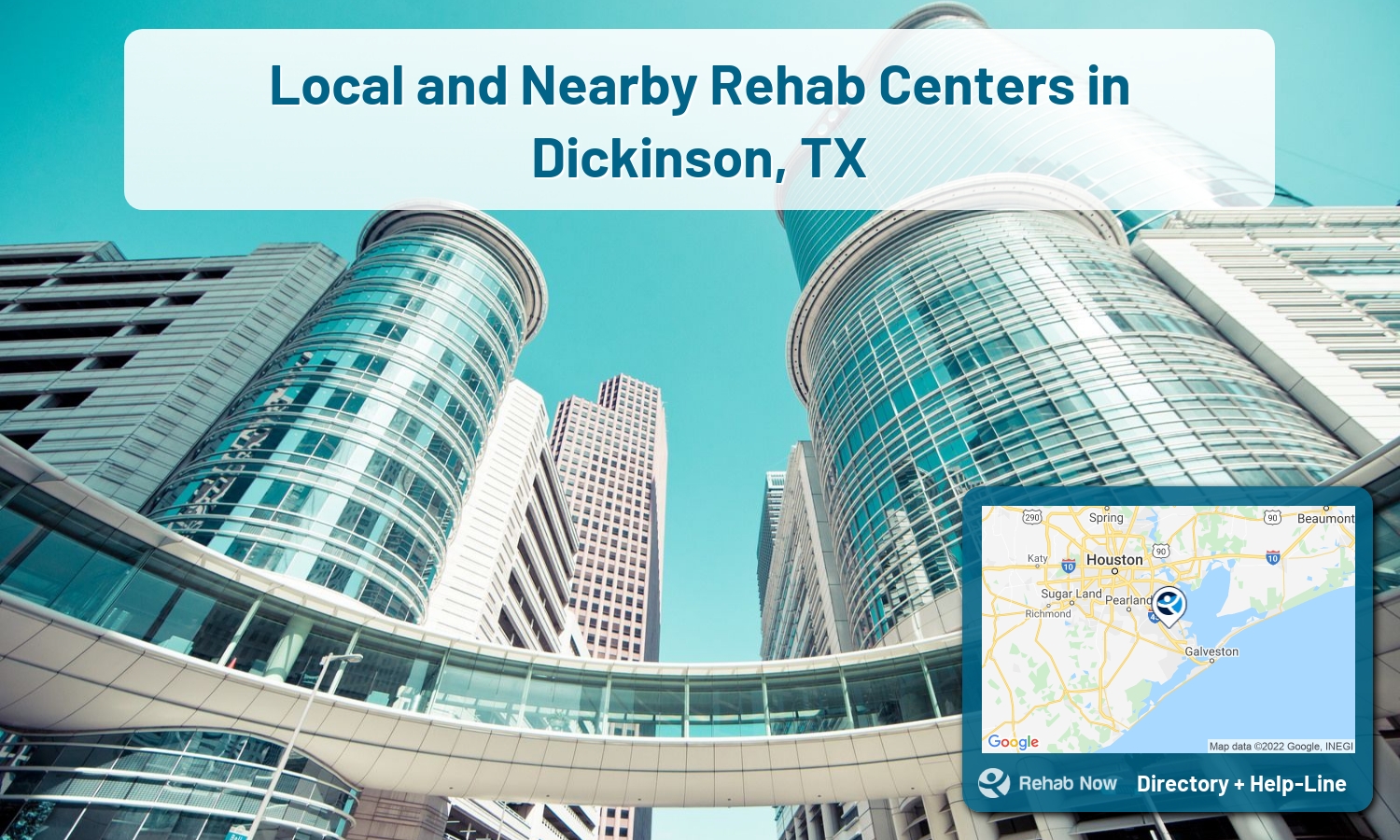Local and Nearby Rehab Centers in Dickinson, TX
Dickinson, Texas is not immune to the drug addiction and abuse problems that are plaguing communities across the country. In fact, it is estimated that 1 in 10 people in Dickinson suffers from some form of substance abuse. This means that there are many people struggling with addiction who need help but don’t know where to turn.
There are a variety of reasons why someone may turn to drugs, including peer pressure, curiosity, boredom, and to self-medicate for a mental health disorder. Substance abuse disorder is a mental illness that can cause severe cravings for drugs or alcohol, and lead to compulsive use despite negative consequences. If left untreated, substance abuse disorders can lead to addiction, which is a chronic and relapsing disease.
With a variety of opioid and alcohol rehabilitation services operating right in Texas, there is opportunity for treatment and a better life. Find out about a facility on our list below that suits your needs, or contact us for individual recommendations.
Contact an Admissions Expert Today, Free.
We will help you find treatment based on your location, budget, and specific needs and help you get started safely.
Free + Confidential Consultation
Browse 10 Centers in Dickinson, Texas
Bay Area Recovery Center is a comprehensive drug rehab facility in Dickinson, Texas that provides specialized opioid addiction treatment including inpatient care, detoxification and long-term aftercare support services, accepting private health insurance and providing personalized treatment plans for each individual.
Bay Area Recovery Center - Men's Inpatient Rehab Center
The Bay Area Recovery Center is a leading addiction treatment facility located in Dickinson, TX offering comprehensive and evidence-based treatment services, such as detoxification, residential and inpatient levels of care and aftercare support, to help those suffering from opioid addiction, substance abuse, drug addiction and alcoholism.
Bay Area Recovery Center Women's Facility is a privately owned, accredited and licensed center that provides comprehensive inpatient and outpatient programs for recovery from alcohol, opioid and substance abuse, offering customized treatments and resources as well as accepting private health insurance.


PaRC Memorial Hermann Prevention & Recovery Center - Termini Street
The PaRC Memorial Hermann Prevention & Recovery Center in Dickinson, Texas provides high-quality, individualized substance abuse and addiction treatment services, including outpatient and residential care, specialized services for co-occurring mental health conditions and trauma, as well as family support and education.
AIM Recovery Center is a JCAHO accredited drug rehab facility that provides inpatient, outpatient, and residential levels of care for individuals struggling with substance abuse, dual diagnosis, and addiction.

Bay Area Recovery Center is a state-licensed addiction treatment facility in Dickinson, Texas that offers a range of services for treatment of substance use disorders, and is accredited by SAMHSA and accepts private health insurance.


Bay Area Recovery Center is an accredited SAMHSA and state licensed facility in Dickinson, TX that specializes in providing evidence-based inpatient, aftercare support, and detox services for substance addiction, dual diagnosis, alcohol abuse, and opioid addiction.


Omega Alpha House - Women's Center
Omega Alpha House is a Women's Center in Dickinson, Texas providing comprehensive treatment and evidence-based therapies for substance abuse and dual-diagnosis, as well as support and resources to help clients on their journey to sobriety.
Bay Area Recovery Center - Women's Facility
Bay Area Recovery Center - Dickinson
Information About Substance Abuse and Addiction in Dickinson, TX
Drinking alcohol and using drugs may seem like a way to relax or have fun, but for those with addiction, it can quickly spiral out of control. Addiction is a serious medical condition that requires professional treatment and support.
The city of Dickinson offers a variety of resources for those struggling with addiction, including Alcoholics Anonymous, Narcotics Anonymous, and the Dickinson Substance Abuse Coalition. These organizations can provide support and information about treatment options.
Drug rehab centers are also available in and near Dickinson. These centers offer a variety of services, including detoxification, individual and group counseling, 12-step programs, and medication-assisted treatment.

What types of treatment are available in Dickinson, Texas?
There are a variety of drug rehab centers in Dickinson, TX to choose from, including inpatient and outpatient facilities, as well as faith-based and 12-step programs.
Inpatient facilities provide 24-hour care and supervision, and patients typically stay for 30 to 90 days. These programs usually include detoxification, individual and group counseling, and life skills training.
Outpatient facilities allow patients to live at home while attending treatment during the day. These programs typically last for 12 weeks or more and are recommended for those who have mild addiction or have already completed an inpatient program.
Faith-based programs incorporate religious teachings into treatment, and patients typically stay at the facility for 30 to 90 days. These programs can be helpful for those who want to explore their spirituality as part of their recovery.
12-step programs follow a set of guidelines that emphasize abstinence from drugs and alcohol. These programs are typically free to join, and patients can attend meetings on a regular basis.
Drug and Alcohol Statistics in Dickinson, Texas
According to the 2016 Texas School Health Survey, 11.3% of high school students in Dickinson reported using an illicit drug other than marijuana in the past 30 days. The most commonly used drugs were inhalants (4.8%), synthetic marijuana (3.7%), and prescription drugs that were not prescribed to them (2.6%).
In addition, the 2017 Texas Youth Risk Behavior Survey found that 18.8% of high school students in Dickinson reported drinking alcohol in the past 30 days, and 7.1% reported binge drinking (drinking 5 or more alcoholic beverages in a row).
- About 15% of drug users in Dickinson are under the age of 18.
- 22% of high school students in Dickinson report using tobacco products.
- 19% of DWI arrests in Dickinson are made of people under the age of 21.
- 37% of people in Dickinson who start drinking before the age of 21 will develop alcoholism at some point in their lives.
Additional Treatment Centers in Texas
Texas is one of the primary hubs for drug smuggling into the country. The border between Texas and Mexico is more than 1,000 miles long. More than 10 million residents use alcohol every year and more than 25% of those are minors. Alcohol and drug use has become so common in Texas that almost 15% of all deaths can be attributed to these substances.
Still haven't found the right recovery center? Browse nearby Texas cities.
- Baytown, TX (19.6 mi.)
- Decatur, TX (300.9 mi.)
- Spring Branch, TX (203.6 mi.)
- Canyon Lake, TX (195.0 mi.)
- Morgan, TX (233.2 mi.)
- Brownfield, TX (498.1 mi.)
- Whitney, TX (218.9 mi.)
- Kingwood, TX (41.6 mi.)
- Fort Worth, TX (264.8 mi.)
- Lewisville, TX (273.3 mi.)
- Livingston, TX (86.8 mi.)
- Hunt, TX (260.7 mi.)
- Houston, TX (227)
- Dallas, TX (120)
- San Antonio, TX (108)
- Austin, TX (104)
- Fort Worth, TX (85)
- El Paso, TX (44)
- Lubbock, TX (34)
- Corpus Christi, TX (31)
What are some signs that a person may be addicted to drugs?
One of the most common signs of addiction is a sudden change in behavior. This can include anything from acting withdrawn or isolated to becoming more aggressive or moody.
There may also be physical signs of addiction, such as weight loss or gain, changes in sleep patterns, and fatigue.
Those who are addicted to drugs may also begin to neglect their personal appearance or hygiene. They may stop caring about their hobbies or interests, and their work or school performance may suffer.
Additionally, those with addiction may start to engage in risky behaviors, such as using needles to inject drugs or driving while under the influence.
If you see any of these signs in a friend or loved one, it’s important to reach out and offer help.
How can addiction be treated?
A professional can create a personalized treatment plan that may include detoxification, therapy, and medication. Detoxification is the process of removing drugs or alcohol from the body, and it should always be done under medical supervision to avoid complications.
Therapy can help people to identify and address the underlying causes of their addiction, and it can be done in individual or group settings. Medication can also be used to manage withdrawal symptoms and cravings, making it easier to abstain from drugs or alcohol.
Do rehab centers have special programs?
While some patients may benefit from traditional detox and counseling, others may require more specialized care. For example, pregnant women or those with young children may need to be in a facility that can provide childcare services.
Some rehab centers also offer programs specifically for teens or young adults. These programs may include family therapy, life skills training, and group activities.
Additionally, there are rehab centers that specialize in treating specific types of addiction, such as alcohol or prescription drug addiction.
Others who have been through treatment before may need a more intensive program, such as an inpatient facility that provides 24-hour care.
Should I attend state-funded or private rehab?
State-funded rehab programs are typically more affordable than private facilities, but they may also have longer waitlists and less comprehensive treatment options. Patients also need to meet certain criteria to be eligible for state-funded care.
Private rehab centers usually provide more individualized care, and patients can typically begin treatment sooner. These facilities may also offer a wider range of amenities and treatments, but they can be more expensive.
Some private facilities also offer luxury amenities, such as private rooms and fitness centers. These extra amenities may make treatment more comfortable, but they can also increase the cost.
What should I look for in a treatment facility?
The most important thing to look for in a treatment facility is whether or not they are accredited by a nationally recognized organization, such as the Joint Commission. This ensures that the facility meets certain standards of care.
You should also inquire about the staff’s qualifications and experience. The facility should have a medical director who is a licensed physician, and the staff should include nurses, counselors, and therapists.
It’s also important to make sure that the facility offers the types of treatment that you need. If you have a specific addiction, such as alcohol or prescription drugs, you should look for a facility that specializes in treating that addiction.
Other things to consider include the length of time the facility has been in operation, the types of treatment they offer, and whether or not they have a good reputation.
How do I know if treatment is working?
One of the best ways to gauge whether or not treatment is working is to attend regular counseling sessions and therapy sessions. During these sessions, you will be able to talk about your progress and any challenges you’re facing.
The most common sign that treatment is working is if you’re able to abstain from using drugs or alcohol. However, other signs of progress may include improved mental health, increased job satisfaction, and enhanced relationships.
If you’re not seeing any progress after a few months of treatment, it may be time to consider a different facility or treatment program.
Our experts can help you find treatment now in Dickinson, Texas. We list drug rehab and alcohol centers in Texas. (888) 674-0062.


